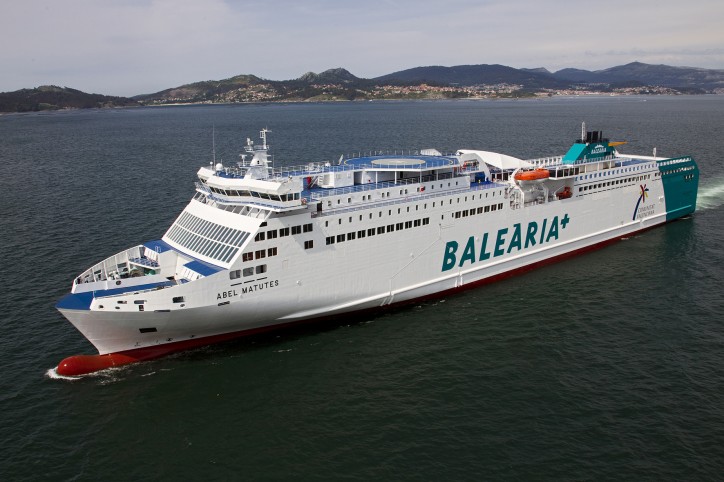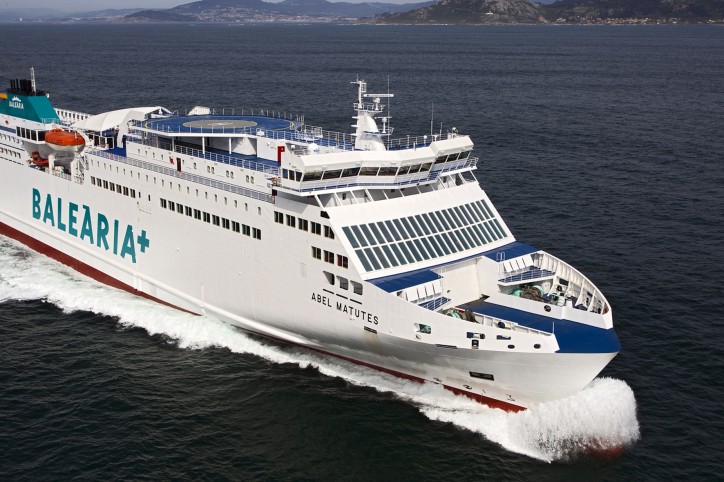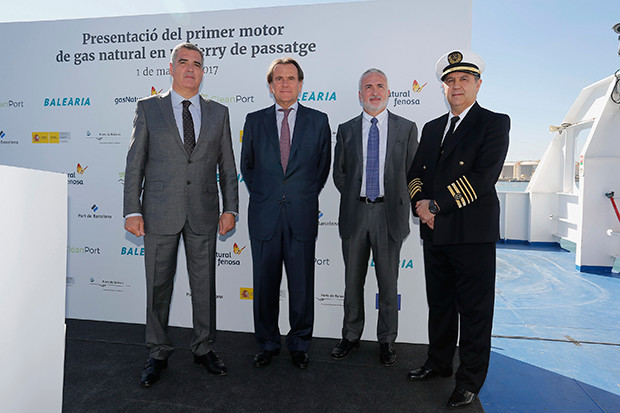Gas Natural Fenosa and Baleària officially launch Spain’s first natural-gas engine for passenger boats, in the Port of Barcelona
- The first of its kind in Spain, the goal behind the project is to reduce emissions and improve air quality in urban environments such as the ports of Barcelona and Palma de Mallorca.
- The initiative, which is part of the European CLEANPORT project, involves the power multinational and the shipping company working together in the Port of Barcelona, the Generalitat of Catalonia and Barcelona City Council.
GAS NATURAL FENOSA and Baleària officially launched on March 1, Spain’s first natural gas engine for passenger boats, in the Port of Barcelona. Both companies have fostered the development and installation of the auxiliary engine and a 30 m3 tank of liquefied natural gas (LNG) (which can operate for one week) on the ferry Abel Matutes owned by Baleària, which operates a daily Barcelona-Palma de Mallorca route. The project to transform the ferry was carried out without interfering with its routes and operations.

Ferry Abel Matutes
The launch was attended by the Chairman of Baleària, Adolfo Utor, the General Manager of Retail Businesses at GAS NATURAL FENOSA, Daniel López Jordà, and the President of the Port of Barcelona, Sixte Cambra.
The Chairman of Baleària, Adolfo Utor, commented that this project involved “the solid first step in Baleària’s support for natural gas”, with shipping a worldwide pioneer in its use, through the current construction of three smartships powered by LNG. Utor remarked that a commitment to the environment and the use of non-polluting energy was “a strategic decision for the company”.
Meanwhile, the general manager of Retail Business at GAS NATURAL FENOSA, Daniel López Jordà, stated that the project was “a major commitment from our company to innovation, with the goal of achieving better air quality, in both the city and the port. Natural gas will be a key factor in the transport sector in the coming years, owing to its clear contribution to reducing emissions and suspended particles”.
The President of the Port of Barcelona, Sixte Cambra, highlighted how this initiative demonstrated Baleària’s big vision of the future and set “out the path to follow”. “The key element here in the Air Quality Improvement Plan for the Port of Barcelona is the adoption of LNG as an alternative transport fuel, seeing as, besides significantly reducing atmospheric emissions, it makes transport more competitive and, by extension, industry too. Furthermore, having LNG-supply infrastructure enables the Port of Barcelona to attract the “more modern and energy-efficient” ships.

Ferry Abel Matutes
A pioneering project to improve the quality of air in both the city and the port
The new natural gas engine is fully integrated into the ship’s electricity plant, enabling it to operate with any of the auxiliary engines, with no visual impact. The ship consumes natural gas in its manoeuvres to approach and leave the port and for its electricity production while it is docked, instead of its usual fuel. The ferry, which measures 190 metres in length, has a capacity of 900 people and 2,235 linear metres of wheeled cargo. Application of this technology will lead to an emissions reduction and an annual saving of almost 4,000 tonnes of carbon dioxide (CO2), over 60 tonnes of nitrogen oxide (NOx) and 6 tonnes of sulphur oxide (SOx).
GAS NATURAL FENOSA has been developed developed innovative tailor-made custom solutions for the market sectors that wish to be serve as examples in the transformations to latest-generation equipment, which involve financial savings and environmental improvements. After wide-ranging experience on land, the company is concentrating on natural gas uses for the maritime sector.
The GAS NATURAL FENOSA and Baleària project is part of the CLEANPORT initiative and is being cofunded by the European Union under the CEF-Transport programme. Also taking part are the ports of Barcelona and Palma de Mallorca, and the Directorate-General of the Merchant Navy.
First bunkering of the ferry Abel Matutes
Last January saw the power company perform its first loading or bunkering of liquefied natural gas (LNG) for the Baleària ship Abel Matutes. The loading of natural gas was part of the energy supply contract signed by GAS NATURAL FENOSA and Baleària when they launched the project, and represented the first operation of its kind in the Port of Barcelona.
Leader in supplying LNG to end customers
GAS NATURAL FENOSA has been carrying out intense European-level commercial activity over the last year to promote the use of natural gas as a maritime propulsion fuel, given its awareness of the environmental benefits this energy can offer in urban and maritime environments. The use of natural gas as a fuel is one of the strategic activities of the company, which currently supplies more than 6 TWh a year, making GAS NATURAL FENOSA the leading supplier of LNG to end customers on the Iberian Peninsula.

(from left to right) Adolfo Utor (Baleària), Sixte Cambra (Port of Barcelona), Daniel López Jordà, (Gas Natural Fenosa) and the captain of the ferry Abel Matutes. (Image courtesy of Gas Natural Fenosa)
About Baleària
Baleària is the leading passenger transport and cargo shipping line in routes to the Balearic Islands and between Ceuta and Melilla and mainland Spain, and operates in four other countries. The company is a benchmark for service, innovation and social responsibility in the Spanish maritime transport sector. In 2016, the shipping company carried over 3,500,000 passengers and 5,000,000 linear metres of cargo on the 18 lines it operates, with a turnover of 330 million euros.
The Port of Barcelona opts for LNG
The Air Quality Improvement Plan of the Port of Barcelona is intended to make an effective reduction of polluting emissions from the port’s activity through a total of 53 initiatives. The Port is participating in various European projects to provide the port area with all the infrastructure necessary to supply LNG to ships, lorries and terminal machinery.
Source: gas Natural fenosa